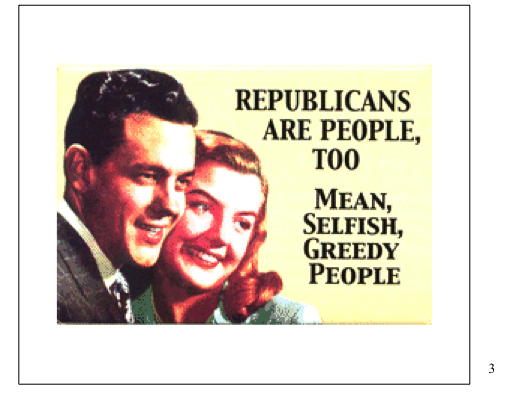In the Washington Post, George Will writes a column about the relationship between political affiliation and personal charitable giving. It begins this way:
Residents of Austin, home of Texas’s government and flagship university, have very refined social consciences, if they do say so themselves, and they do say so, speaking via bumper stickers. Don R. Willett, a justice of the state Supreme Court, has commuted behind bumpers proclaiming “Better a Bleeding Heart Than None at All,” “Practice Random Acts of Kindness and Senseless Beauty,” “The Moral High Ground Is Built on Compassion,” “Arms Are For Hugging,” “Will Work (When the Jobs Come Back From India),” “Jesus Is a Liberal,” “God Wants Spiritual Fruits, Not Religious Nuts,” “The Road to Hell Is Paved With Republicans,” “Republicans Are People Too — Mean, Selfish, Greedy People” and so on. But Willett thinks Austin subverts a stereotype: “The belief that liberals care more about the poor may scratch a partisan or ideological itch, but the facts are hostile witnesses.”
Will’s column proceeds to discuss a book by Professor Arthur C. Brooks titled “Who Really Cares: The Surprising Truth About Compassionate Conservatism,” as well as some other tidbits taken from Justice Willett’s review of that book in last fall’s issue of the Texas Review of Law and Politics.
For those who don’t always find law review articles entertaining (and, if you don’t, I think you may be on the wrong blog), you will be relieved to know that Willett’s article includes color images of various signs and bumper stickers (as well as a Peanuts cartoon for good measure). Here’s a sample:

Yes, that little numeral three in the corner is a footnote. While you may never before have wondered how to cite to a bumper sticker in proper bluebook form, you’ll be pleased to know that Justice Willett’s “intrepid” research assistant (credited in the first footnote) has found an answer that survived editorial-board scrutiny.
Contrary to his initial expectations, Brooks found in his study — Who Really Cares: The Surprising Truth about Compassionate Conservatism — that conservative politics strongly correlated with personal charity. Willett’s piece explores what aspects of conservatism might lead to this statistical result and ultimately praises Brooks’s conclusion that the answer is for both sides of the political divide to more fully embrace charity. (( From Willett’s article:
Most of this chapter, though, is devoted to Brooks’ exhorting
liberals to put their money, literally, where their mouths are and to
confront head-on “one of the greatest political hypocrisies of our time
. . . the pious sloganeering about liberals in America being more
compassionate than conservatives.” Brooks is adamant: “This
stereotype is false, and it is a disservice to our country.” Liberals
should be proud liberals, he insists, and not reject their core values,
but they should reject those forces that depress personal generosity: “I
am asking liberals to stand up for charity.” ))


